Dear Reader, in this age of AI created content, please support with your goodwill someone who works harder to provide the human-made. Sign up at the top of the lefthand column or bottom of this page. You will receive my hand illustrated monthly newsletter RESTORE NATURE and access to the biodiversity garden design course as I write...and nothing else, I respect your time. I am also removing the advertizing as best I can as its become intrusive inappropriate and pays me nothing.
The Soil2Soil Project
The Soil2Soil Project is an idea for linking sanitation and urban rehabilitation birthed by Riyaaz Ismail and Caroline Kloppert with the close collaboration of Vermiculturist Stephan Kloppert.
It utilizes the biological chain reaction of decomposition to connect humans with renewed urban landscapes on a physical level, passing on nutrients and calorie yielding molecules excreted by us and processing them to serve all different kinds of needs.
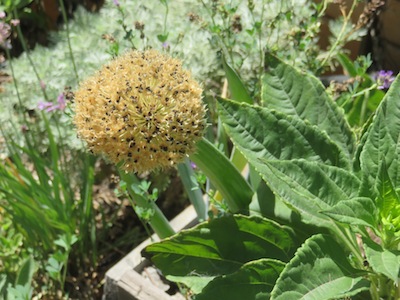 Imraan's garden
Imraan's gardenSoil2Soil uses a raw material people produce en masse right there in the place where we gather en masse, in cities, creating need for jobs, energy, food, sanitation and water. This simply means we turn human toilet waste into an incredible resource. We harness the natural decomposition of feces and urine to produce value in a series of composting or preferably 'production' or recycling stages where tiny organisms do all the work. While so doing we turn a potential danger to health into a safe sanitized soil enhancer by using five processes which remove pathogens from human manure, namely biogas production, hot composting, mushroom growing, vermiculture and the passage of time. Just one of these would be a good thing, but we want to be five times sure ! Then to further demolish the bad organisms we have tow final 'post production' stages. We grow food forests, herbs and trees on the soil on top of which the final composting process occurred, which has been loosened and enriched by the addition of vermi castings and worm action.
Then we ensure that the human's ecosystems are also functioning in a very healthy way. We pass on how to ferment the olives and other products of the food forests to provide those who eat with excellent gut health !
Our ideal landscapes
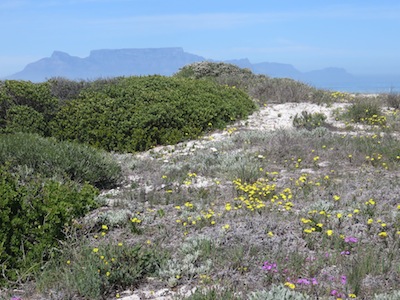 Our Eden like ancient coastal vegetation: creeping sand holding groundcovers, succulents, legumes, flowers, sedges, and low wind shaved bushes.
Our Eden like ancient coastal vegetation: creeping sand holding groundcovers, succulents, legumes, flowers, sedges, and low wind shaved bushes.One outcome of Soil2Soil's method is to contribute to re-greening the city, covering it with diverse drought adapted vegetation, of differing heights, giving different cover, and serving different ecological and human purposes, so that future drought may be alleviated and the people nurtured. We cannot go back to what it once was, as the great need for food in the metropolis must be met, but we can use adapted food plants and low maintenance growing methods which use little to no water, and we can cover the earth with plants, to save water.
Our degraded landscapes
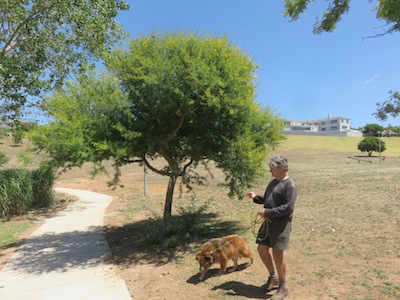 A huge park in Durbanville, with some trees and a lake and 95% dead mown grass and hardpan clay ground.
A huge park in Durbanville, with some trees and a lake and 95% dead mown grass and hardpan clay ground.We would like to start a movement to turn around urban desertification caused by monocultural landscapes like these, seen in a park in Durbanville. We do not want to convert land with indigenous vegetation, only the degraded land like this, which consists mostly of Kikuyu grass that dies back in summer, drying into a hard cake that repels water, expelling it from the landscape rapidly, instead of recharging deeper soil layers. Such wastelands are found everywhere in the city, in rich and poor areas. They are a major reason why the city suffers so much desiccation when rainfall is reduced, but they are not the only reason.
We feel that turning such spaces into rich productive areas covered in different plants instead of the usual monocultures for mowing will help turn the city into a water retentive landscape, create greater biodiversity and resilience, support food security in parts of the town where it is greatly needed, and beautify Cape Town for the wellbeing of all, especially in areas without much proper green-space.
deforestation and water shortage a stark tale that goes a long way back
Akira Miyawaki and Shubhendu Sharma, icons of afforestation
the biggest urban people's park in the world
Soil2Soil
the solutions to sanitation and desertification, food insecurity and more
Compost toilets
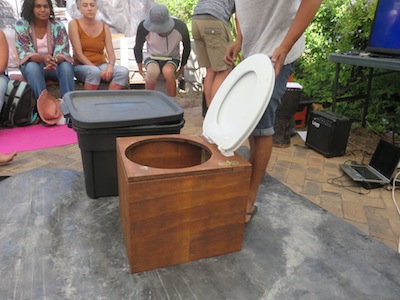 Guerilla House workshop. The black plastic tote box which was turned into a loo in only 15 minutes.
Guerilla House workshop. The black plastic tote box which was turned into a loo in only 15 minutes.Many people in the city are engaged with designing and building commodes for collecting humanure. I wrote an article on the Guerilla House workshop which you may like to consult, the link is below. The workshop shows you how to make a quick and easy commode in a crisis, as well as find long term solutions. The question at the collection stage is whether to separate urine or not and debates are certainly as heated and diverse as any steamy compost pile.
how to process humanure safely
Biogas production
Flowbin or IBC biodigester on u-tube
DIY ecohouse pages on biogas, methanogenesis etc. Apologies, but please cut and paste the url into your search tab, direct links on this page are limited.
https://diyecohouse.weebly.com/anaerobic-digester.html
https://diyecohouse.weebly.com/biogas.html
https://diyecohouse.weebly.com/biogas-production.html
https://diyecohouse.weebly.com/anaerobic-digestion.html
Hot composting
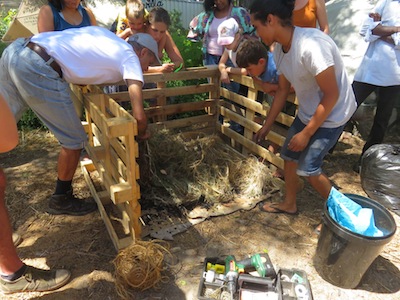 Riyaaz, Imraan and others making a high carbon nest for humanure, giving fast, odorless decomposition !
Riyaaz, Imraan and others making a high carbon nest for humanure, giving fast, odorless decomposition !A popular humanure compost bin uses recycled pallets because they make a bin of the perfect size and are quick and easy to assemble. Everyone is using them. Here is Riyaaz of the Soil2Soil Project on the left getting pro-active while Imraan of Guerilla House (right) supervises ! Soil2Soil has a new idea for making humanure composters that we will share publicly soon.
humanure composting photographs
a hybrid waterborne-composting hack, ready in a jiffy
Mushroom growing
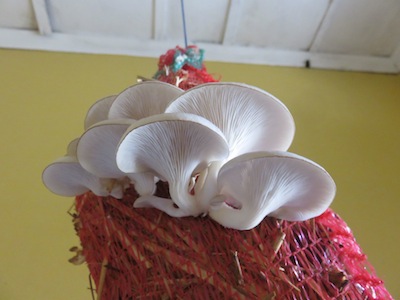 Mushrooms growing on straw in the bathroom
Mushrooms growing on straw in the bathroomHere are my husband's little oyster mushrooms sprouting in the bathroom. There are many kinds of mushrooms and some of them are coprophiles (poop lovers). Mushroom mycelium absorbs and destroys not only petrochemicals, but a number of pathogens found in human feces. Soil2Soil hope to be working with a wonderful wild mushroom grower, but if you'd like to read about this look at Paul Stammet.
mushroom leather: a winner in multiple ways
growing oyster mushrooms on straw
growing low tech mushroom spawn
growing mushrooms outside in garden beds
Vermiculture
a pretty informative worm blog and website
Food forests in the making
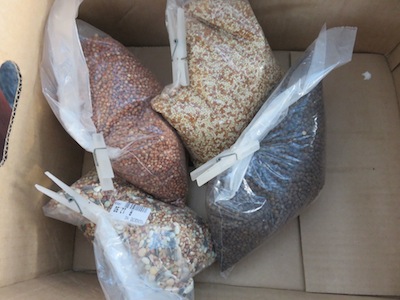 Sorghum, millet, maize, wheat, barley, wild peas, lentils, sunflowers, dog friendly cover crops
Sorghum, millet, maize, wheat, barley, wild peas, lentils, sunflowers, dog friendly cover cropsOne of the first stages in establishing a man-made forest is to scatter pioneer ground cover (look up Jeff Lawton videos on permaculture food forests). Here in the form of selected seeds that are tough, quick growing and usually nitrogen fixing. We are creating a food producing ecosystem this way, that self sustains, rather than needing constant attention. Growing many many hardy useful trees and support species for the Soil2Soil project is essential. I've grown a number of hardy African fruit trees and hope to use this knowledge to the benefit of all on a larger scale. I attended a fascinating seed saving workshop at SEED, the Rocklands Urban Abundance Centre.
improve your garden soil with cover crops
Mediterranean climate's gardening challenges
Secret secretions of plants are the biggest factor in soil rehabilitation
Understanding the essentials of carbon and soil rehab, 5 core principles
A bountiful harvest
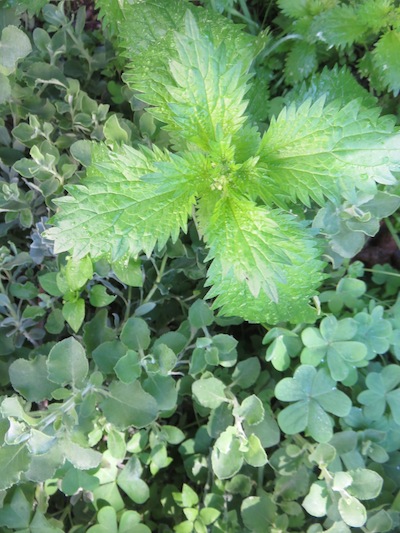 Nettles, Suurings and Blousalie, all edible.
Nettles, Suurings and Blousalie, all edible.The plants above grow 'wild' with no labour but harvesting needed, in my garden. Those below can also be grown in mixed beds with some care as to planting choices and spacing.
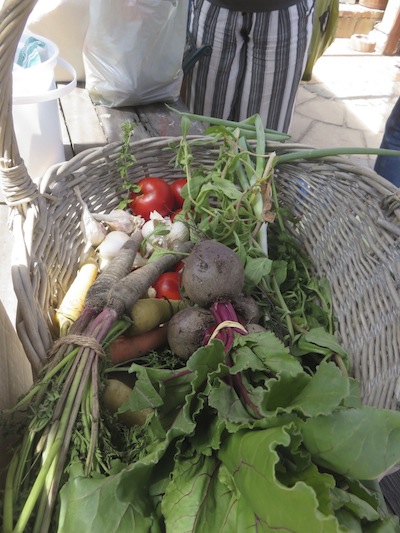 A hamper of organic veggies brought to Zayaan Kahn's fermentation workshop at Cape Point
A hamper of organic veggies brought to Zayaan Kahn's fermentation workshop at Cape PointWild food plants in the Fynbos
A plethora of products
 A four berry cheese tart by Leonie with biscuit base which would be a hit in most coffee shops.
A four berry cheese tart by Leonie with biscuit base which would be a hit in most coffee shops.This delicious pie contains four berries which can all be grown in agroforestry (mixed trees and other plantings). One can also make wine, vinegars, pickles, soups and salads from a small garden. But that is not all that can be harvested. Fire and building wood, cork, medicine, tea, honey, mushrooms, fibre, herbs, flowers, fruit, spices and vegetables are planned for the Soil2Soil plantings and additional forms of farming downstream.
We plan to pass on how the food can be processed organically to increase its value with the production of dried herbs, oils, essential oils and ferments. In addition our project would produce biogas, 3 kinds of compost, and worms which are a very desirable for large scale export. But its greatest monetary value may be in savings. Saving arable soil, saving on petrochemical fertilizers, and savings for the city and communities on energy, water and sanitation.
------
------
------
-------
------
Loubie Rusch indigenous food cooking page on facebook
------
home page for links to all kinds of natural gardening topics
Restore Nature Newsletter
I've been writing for four years now and I would love to hear from you
Please let me know if you have any questions, comments or stories to share on gardening, permaculture, regenerative agriculture, food forests, natural gardening, do nothing gardening, observations about pests and diseases, foraging, dealing with and using weeds constructively, composting and going offgrid.
SEARCH
Order the Kindle E-book for the SPECIAL PRICE of only
Prices valid till 30.09.2023
Recent Articles
-
garden for life is a blog about saving the earth one garden at a time
Apr 18, 25 01:18 PM
The garden for life blog has short articles on gardening for biodiversity with native plants and regenerating soil for climate amelioration and nutritious food -
Cape Flats Sand Fynbos, Cape Town's most endangered native vegetation!
Apr 18, 25 10:36 AM
Cape Flats Sand Fynbos, a vegetation type found in the super diverse Cape Fynbos region is threatened by Cape Town's urban development and invasive alien plants -
Geography Research Task
Jan 31, 25 11:37 PM
To whom it may concern My name is Tanyaradzwa Madziwa and I am a matric student at Springfield Convent School. As part of our geography syllabus for this
"How to start a profitable worm business on a shoestring budget
Order a printed copy from "Amazon" at the SPECIAL PRICE of only
or a digital version from the "Kindle" store at the SPECIAL PRICE of only
Prices valid till 30.09.2023







